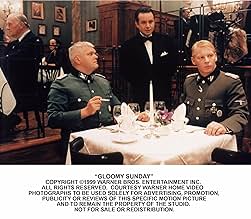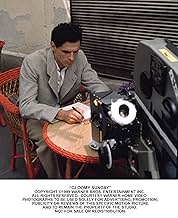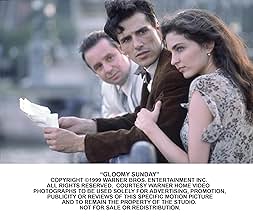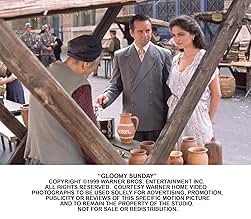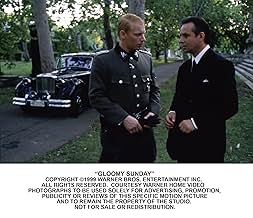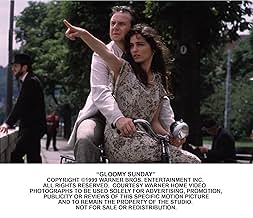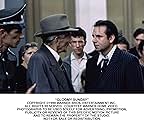CALIFICACIÓN DE IMDb
7.8/10
8.7 k
TU CALIFICACIÓN
Agrega una trama en tu idiomaFollows three men who are in love with a beautiful waitress during World War II: an intellectual restaurant owner, a mysterious musician, and an erratic businessman.Follows three men who are in love with a beautiful waitress during World War II: an intellectual restaurant owner, a mysterious musician, and an erratic businessman.Follows three men who are in love with a beautiful waitress during World War II: an intellectual restaurant owner, a mysterious musician, and an erratic businessman.
- Dirección
- Guionistas
- Elenco
- Premios
- 7 premios ganados y 5 nominaciones en total
- Dirección
- Guionistas
- Todo el elenco y el equipo
- Producción, taquilla y más en IMDbPro
Opiniones destacadas
Fact and fiction combine to provide a delightfully entertaining film about a restaurant in Budapest. Clientele flocked there for the good food, the good music and I daresay the beautiful Ilona who served on the tables. What more could one wish for? Unfortunately the good times do come to an end when the Nazis sweep into Hungary and decide forthwith to eliminate the Jewish population.
Strange as it may seem the whole theme of the film revolves around a plaintive tune which first gained popularity in Budapest, later in Europe and then the whole world. The words to the song called "Gloomy Sunday" are full of despair.
The clients who came to the restaurant always asked for this particular melody to be played on the grand piano. It is played many times during the film. It is haunting and addictive. We find ourselves wanting to hear it again and again such is its hypnotic power.
All praise to Erika Marozsan who provides the romantic interest as Ilona in the story. I am told she is a newcomer to the screen, but as an actor she will surely be much sought after in the future. She is beautiful and her close-ups full of feeling. She has lovely hands that caress a lover's face with such gentle charm. She is much admired by Lazlo (Joachim Krol) owner of the restaurant and also by Andras (Stefano Dionisi) newly appointed pianist and composer of "Gloomy Sunday".
All goes well for the threesome until the arrival of a Nazi officer (Ben Becker) who takes a fancy to Ilona despite her constant rebuttals. In their position of power Nazis have the means of disposing of people who stand in their way.
This is a film of contrasts. First we have the beautiful setting which is Budapest, romantic songs and people in love. Then we have the Nazi occupation, loss of freedom and threats of Auschwitz.
This film must be seen to the end. There is an amazing twist of Fate in the last few minutes and it seems to me that at last in some remarkable way justice is seen to be done.
Strange as it may seem the whole theme of the film revolves around a plaintive tune which first gained popularity in Budapest, later in Europe and then the whole world. The words to the song called "Gloomy Sunday" are full of despair.
The clients who came to the restaurant always asked for this particular melody to be played on the grand piano. It is played many times during the film. It is haunting and addictive. We find ourselves wanting to hear it again and again such is its hypnotic power.
All praise to Erika Marozsan who provides the romantic interest as Ilona in the story. I am told she is a newcomer to the screen, but as an actor she will surely be much sought after in the future. She is beautiful and her close-ups full of feeling. She has lovely hands that caress a lover's face with such gentle charm. She is much admired by Lazlo (Joachim Krol) owner of the restaurant and also by Andras (Stefano Dionisi) newly appointed pianist and composer of "Gloomy Sunday".
All goes well for the threesome until the arrival of a Nazi officer (Ben Becker) who takes a fancy to Ilona despite her constant rebuttals. In their position of power Nazis have the means of disposing of people who stand in their way.
This is a film of contrasts. First we have the beautiful setting which is Budapest, romantic songs and people in love. Then we have the Nazi occupation, loss of freedom and threats of Auschwitz.
This film must be seen to the end. There is an amazing twist of Fate in the last few minutes and it seems to me that at last in some remarkable way justice is seen to be done.
10crisbob
Beautiful Budapest, end of the thirties. Lazlo Szabo a middle-aged jew Hungarian runs a chic restaurant with a beautiful waitress,Ilona who is also his mistress. One day they decide to hire a pianist, and it's Ilona who choose. And it's a good choice because the handsome young man, Andras, creates a wonderful mood on the premises. Little by little he falls desperately in love with Ilona and composes specially for her a song, very melancholic, and a bit misterious. He calls it " Gloomy sunday ". This song brings surprisingly a lot of suicides. The love-triangle functions pretty well until the time a german customer, Hans, who comes regularly in the restaurant falls in love with Ilona, without success.A few years later the german army invades Hungary, Hans is back as a highly placed officer and the jewish condition of Lazlo is going to complicate the lives of the four protagonists. This movie is a master- piece and I'd bet if the film had been produced in Hollywood with Stone, Douglas and Harrison Ford, directed by Cassavetes it would have gained several Oscars. It has all a movie fan can expect from a good film -and more. Beautiful scenery, very good story, marvelous music, talent of the actors, and even a bit of sex. I rarely see a picture twice on the same day. This time I did.
I wrote this review in December of 2012 when the movie was titled "Gloomy Sunday." A great movie experience. I'm 82 (then) and had been watching movies since I was 18 months old, held in my mother's arms. This is an unforgettable film. Every facet is superb. The acting is flawless, the cinematography is breathtaking, and the gripping story has every human emotion imaginable. It's hypnotic from start to finish, but keep in mind, you have to be attentive. There are some subtle touches that can go unnoticed if you're not carefully observing and listening, and missing them can possibly deprive you of fully understanding and enjoying the fantastic ending. The skilled director doesn't use a heavy hand, and that's admirable. Every single actor gives a perfect performance. Having studied acting for five years, I must mention that they don't act, they behave. Erika Marozsán's portrayal is colossal!. I've fallen in love with her. Even if I were 18 months old now, there's a scene with Joachim Król I'd remember the rest of my life. I've viewed that particular scene about eight times. Gut-wrenching, yet inspirational. Never in my life have a watched any movie four times, and I just saw this one again for the fourth time... in one week! If not for IMDb and Netflix, I would never have heard of it. And it received no nominations for the Academy Awards. Ridiculous! This is truly a masterpiece! I'd never written a review for IMDb before this, but for this film I had to do it. I cannot praise this movie enough!
The charm of this film consist in the way to tell old things, in the description art of a well - known world.
"Gloomy Sunday" is a kind of Frankenstein's creature: pieces of "Lili Marleen", "Casablanca" or "The story of 1900", slices of Hungarian's atmosphere, Nazi ghost and menage en trois.
For all that, it is a good movie, his virtue is, in fact, just absence of originality. Like many other movies, the spell is result of a mysterious flavor who persist in your memory months, years and in special moment it saves the image of a sweet trip.
Undoubtedly, it is the story of a song, in same measure that the song is the only character. But, at second sight, it is a warm homage to Mitteleuropa, the gorgeous Kakania's spirit. The lost of youth and the last recollection's skin. The shadow of Goethe's "The Sorrows of Young Werther" is powerful and insidious.
A subtle wishfulness anatomy. And a song like his backbone.
"Gloomy Sunday" is a kind of Frankenstein's creature: pieces of "Lili Marleen", "Casablanca" or "The story of 1900", slices of Hungarian's atmosphere, Nazi ghost and menage en trois.
For all that, it is a good movie, his virtue is, in fact, just absence of originality. Like many other movies, the spell is result of a mysterious flavor who persist in your memory months, years and in special moment it saves the image of a sweet trip.
Undoubtedly, it is the story of a song, in same measure that the song is the only character. But, at second sight, it is a warm homage to Mitteleuropa, the gorgeous Kakania's spirit. The lost of youth and the last recollection's skin. The shadow of Goethe's "The Sorrows of Young Werther" is powerful and insidious.
A subtle wishfulness anatomy. And a song like his backbone.
I did not necessarily expect this to be a real good movie. Stories taking place during the Nazi regime and WW2, especially when made by Germans, sometimes tend to be ultra-politically-correct. But, surprise, surprise. Rolf Schübel's first feature (he did documentaries before) uses backdrop of Nazi-occupied Budapest to deliver a meaningful "menage-a-quatre", wrapped in a free interpretation of creation of famous suicide hymn "Gloomy Sunday". Fine acting all over the place, especially by Krol and Becker (still brave in German moviemaking to show a Nazi not as a complete monster, even if he is, after all, the bad guy), and despite the overall sad story executed surprisingly lighthanded. Drama, a touch of humor, some suspense and even some sex (however, the latter seems to be unnecessary sometimes - it would have worked without or with less). Not to be forgotten: excellent soundtrack album, including several versions of "Gloomy Sunday". Definitely one of the best German movies of 1999.
¿Sabías que…?
- TriviaWieck, the Nazi played by Ben Becker, is a fictionalized SS Col. Kurt Becher, who was acquitted in Nuremberg of war crimes and who ended up the richest man in Germany.
- ErroresAt a movie theater, the trio watches a newsreel that declares that the song "Gloomy Sunday" "drove 157 people in Hungary to suicide in the past eight weeks." It's unknown whether that statement ever actually appeared in a German newsreel during the war. There is no evidence that the song ever actually drove more than a handful of people--if any--to suicide.
- ConexionesFeatured in Die Männer vom K3: Jugendliebe (1999)
- Bandas sonorasSzomorú Vasárnap/Gloomy Sunday
Music by Rezsö Seress
Lyrics by László Jávor
English lyrics by Sam Lewis (as Sam M. Lewis)
Akla Musikverlag Berlin
Selecciones populares
Inicia sesión para calificar y agrega a la lista de videos para obtener recomendaciones personalizadas
- How long is Gloomy Sunday?Con tecnología de Alexa
Detalles
- Fecha de lanzamiento
- Países de origen
- Idiomas
- También se conoce como
- Gloomy Sunday
- Locaciones de filmación
- Productoras
- Ver más créditos de la compañía en IMDbPro
Taquilla
- Total en EE. UU. y Canadá
- USD 585,604
- Fin de semana de estreno en EE. UU. y Canadá
- USD 7,102
- 22 jun 2003
- Total a nivel mundial
- USD 646,532
- Tiempo de ejecución1 hora 52 minutos
- Color
- Mezcla de sonido
- Relación de aspecto
- 1.85 : 1
Contribuir a esta página
Sugiere una edición o agrega el contenido que falta

Principales brechas de datos
What is the Spanish language plot outline for Gloomy Sunday - Ein Lied von Liebe und Tod (1999)?
Responda

